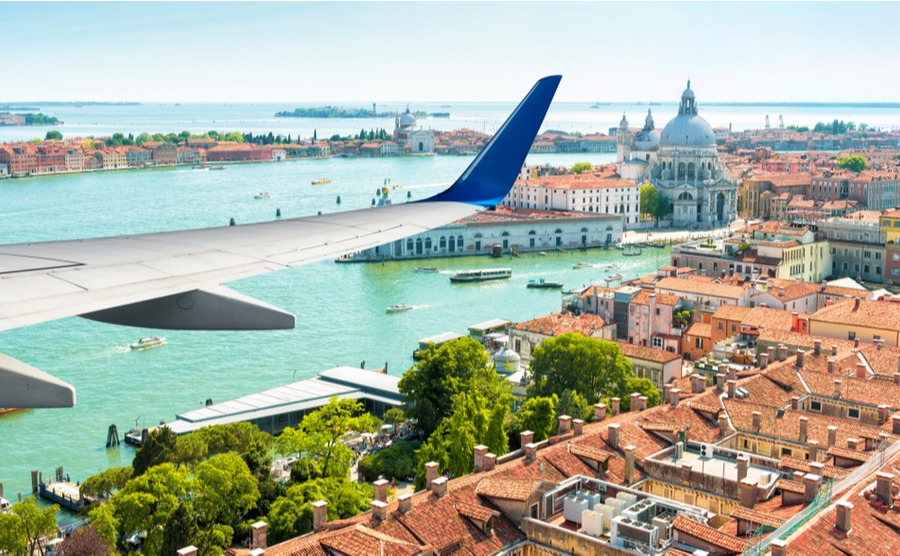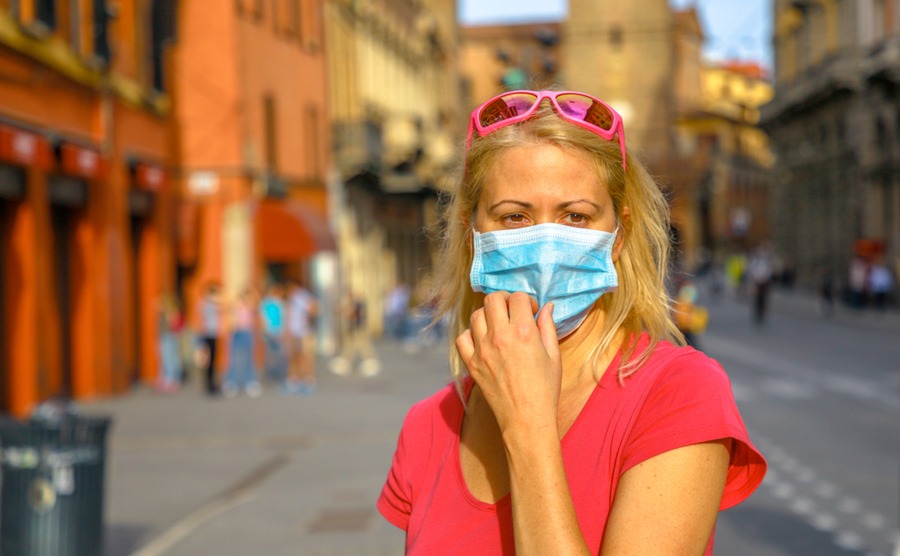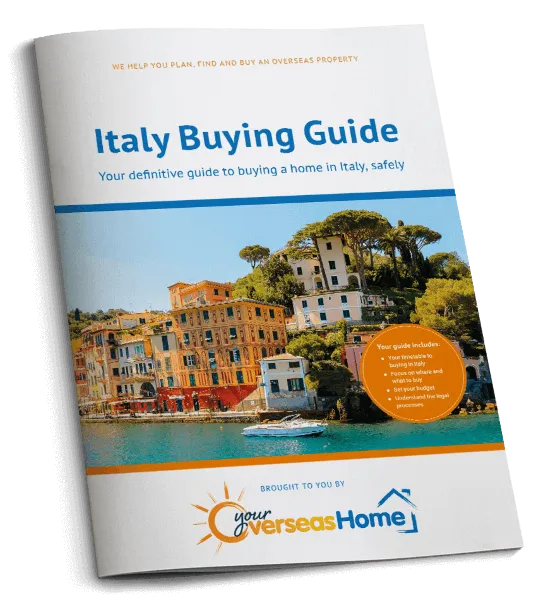Many people are waiting for the green light to travel to Italy. They want to know who can enter, and if it’s safe to go to Italy right now.
Find homes in Italy via our property portal.
Who can make a trip to Italy?
You can enter Italy from the UK, any EU country or a country that is part of the Schengen area. Travellers from these countries are not asked to self-isolate on arrival. From 1 July the EU has opened its borders to a further 15 countries: Algeria, Australia, Canada, Georgia, Japan, Montenegro, Morocco, New Zealand, Rwanda, Serbia, South Korea, Thailand, Tunisia, Uruguay and provisionally China.
However, Italy has decided to keep self-isolation and health surveillance in force for travellers arriving from all nations other than UK, EU and Schengen. This applies even if they are on the new EU list or have passed through a Schengen country. You will be asked which country you originated from. Note that the USA, Russia, Brazil, India and Israel are not on the EU’s “Green list”. You can find an updated list on the Italian Ministry of External Affairs website.

Venice is ready when you are!
Travel corridor to Italy
Air bridges, also known as ‘travel corridors’, are an agreement between two countries to not impose a mandatory quarantine at either end of your journey. The agreements are made between countries which are considered to have low COVID-19 cases. Since 3 June you could travel from the UK to Italy without a mandatory isolation period on arrival in Italy, but the UK have been imposing a two-week quarantine period on your return to the UK.
On 3rd July it was confirmed that from 10th July people arriving in England from Italy will no longer be asked to self isolate on arrival. This would indicate that the UK government’s advice regarding non-essential travel will also be relaxed. The list of countries on the “Travel Corridor” list can be found here. Those travelling from Scotland, Wales or Northern Ireland should check what guidance is being given by those Nations.
Many UK tourists had already started booking travel in anticipation of the announcement of Italy being on the UK’s quarantine exemption list. With July and August being prime holiday time, Ryanair have already been inundated with bookings. However, any agreement between countries will be regularly reviewed.
Flights to Italy
From 1 July airlines have been increasing the number of flights. Check the individual websites of Ryanair, Easyjet, British Airways and Alitalia to see what is available. When I looked on 1 July, Ryanair were selling return flights to Pisa at the end of July for less than £50.
Airlines have also introduced new measures to make your journey as safe as possible. These include, mandatory wearing of masks by crew and passengers, baggage self-check-in, state of the art filtration systems on aircraft and limited queuing. Italy has also banned the use of overhead lockers on flights into Italy. Hand luggage will be restricted to a small bag, that will fit under the seat. This is mainly to prevent the clambering of people in the aisle, eliminate touching of handles, and to get people seated quickly.
WHO gives recognition to Italy
The World Health Organisation director-general Tedros Adhanom Ghebreyesus, on his official Twitter account reported, “Both countries, Italy and Spain, brought their COVID-19 epidemics under control with a combination of leadership, humility, active participation by every member of society & implementing a comprehensive approach. Both countries faced a daunting situation, but turned it around”.
The safest areas of Italy
The number of new positive cases for the whole of Italy has been under 380 a day since 6 June. On 2 June it was only 174. Around 56% of cases have been in the Lombardy region. In this region you are required to wear a mask even in the street, at least until the middle of July. It is the northern regions that have suffered most in the past few months.
The rest of Italy is recording very few new cases. On 28 June, Abruzzo, Bolzano, Sardinia, Calabria, and Friulia Venezia Giulia, recorded one new positive case each and Puglia, Sicily, Umbria, Valle d’Aosta, Molise and Basilicata had no new cases. Tuscany had five and Liguria four.
Travel advice
Government advice regarding travel from the UK to Italy can be found on the gov.uk website . The Italian government have also issued Advice for travelers to Italy. When people are on holiday they often leave their common sense at home. The message from Italy is “Don’t let your guard down”. This is also good advice to house hunters.
Ensuring a safe trip to Italy
The Italian government, regional presidents and mayors of the provinces have issued clear guidance and directives to make sure we can all stay as safe as possible whilst living with the virus among us. No hospitality business wants to risk having to close again.
They have demonstrated that they care deeply about the safety of their staff, regular local customers and tourists. Only opening when they felt confident that they had everything set up, such as spacing of tables, hand sanitizers, specialist cleaning and protective equipment for staff.
Find homes in Italy via our property portal.
Help Italy Track and Trace
The government recommends that you to keep a travel diary, noting when and where you have visited places and people. Some of the tourist regions request that you fill out an online form. You should also be ready to give contact details when booking transport, accommodation, restaurant, sunbeds, attractions etc. The use of card payments is now encouraged.
Register your presence
Some regions have made it mandatory to notify them of your arrival and to register your contact details. These include Sardinia, Sicily, Puglia, Calabria and Basilicata. Check the official regional tourism websites for guidance and links to forms. Airlines may also give instructions on how to register your presence in the country.
Sardinia: If travelling to Sardinia by air or sea, the completion of the online form is mandatory and must be made within 48 hours prior to departure. You will receive an email with a QR code attached to be shown to the boarding staff.
Puglia: Anyone entering the region must communicate arrivals, movements and transfers by filling in the online self-report on the Puglia Region website (available in English). You’ll have to declare the place of origin and the city/town where you are staying and keep a record of visited places and people met during your stay (for up to 30 days).
IMMUNI app
To assist with tracking contacts in Italy the IMMUNI app is up and running, and has so far been downloaded by 4 million people. The app sends an alert in case of a possible contact with a person who has tested positive for Covid-19. It also gives further information on what action to take. It’s easy to download and IMMUNI is also in English.
Regional apps
Several regions have launched independent applications for the quick tracing of infections, such as Lombardy’s “AllertaLOM”. In Sicily the “Siciliasicura” has been downloaded by 38,000 people and is dedicated to tourists who come to their island on holiday. On Sardinia there is the similarly named “SardegnaSicura” .
Wear a mask to Italy
Masks are mandatory on all forms of public transport, including in airports and throughout the flight. All over Italy, masks must be worn in indoor public spaces. It is not mandatory outdoors, except in the event that you cannot keep a safe distance. For example, you may be required to wear a mask on walkways down to private beach facilities or at markets and events.

Wearing a face mask in Bologna
If you develop symptoms
If you show Coronavirus symptoms during your stay, you should immediately self-isolate and contact the regional toll free hotline. The staff at your accommodation should help you contact the health services. If you develop severe symptoms, call the national emergency number 112. As it says on the salute.gov website, “Remember: public healthcare is free in Italy.”
Welcome to Italian Hospitality
Almost everything is now open. You can go to restaurants, bars, shops, museums, theme parks, pools, museums, theatres, zoos etc. All Italian hospitality businesses have been given clear guidelines to enable the safest possible summer for everyone. See guidelines on the official tourism website Italia.it .
In many cases guidelines include wearing of masks in public areas where distancing is difficult, temperature checks at the entrance, hand sanitisers at the door, social distancing of at least 1 metre and booking in advance where possible. In some shops you may also be asked to wear gloves when touching items, such as clothes and food.
Find homes in Italy via our property portal.
Accommodation
Owners of holiday accommodation in Italy are very aware of the importance of ensuring the utmost cleanliness. Many are now employing specialist cleaning teams, to do a thorough sanitation of the rooms between each changeover.
When going into hotels, B&Bs and apartments, your body temperature may be measured and you’ll be expected to sanitize your hands. In communal areas, you need to keep a social distance of at least 1 metre from people not in your group and wear a mask. Italy also offers many great rental villas in the countryside for a perfect getaway and car rental companies are open.
Bars and restaurants
Restaurants, bars, pubs, pastry-shops and ice-cream parlours are open. Being Italy there is plenty of opportunities to dine “al fresco” and be served at the table.
Masks must be worn when you go inside and anytime you get up from your table. Body temperature may be measured at the entrance and hand sanitizer provided. Look out for separate entry (entrate/ingresso) and exit (Uscita) routes. Food and drinks can be ordered at the counter, but you need to keep a distance of at least one metre. It is recommended to make reservations at restaurants.
Estate Agents
It’s recommended to book appointments with estate agents well in advance of your trip to Italy. The agents will be spacing out the times they see clients, to avoid people passing in the office.
Preferably, hire a car and follow the agents vehicle, when going out to see properties. Try to keep viewings down to a minimum by studying property details and the area before your trip. Only view properties you are really interested in. Be aware that, some agents traditionally take a holiday in the first two weeks of August and property owners may also be away.
Don’t miss this window of opportunity to buy a property in Italy before the end of the Brexit transition period. Especially, if you plan on coming to live in Italy. Becoming a resident in Italy before the end of 2020 gives you extra protection under the withdrawal agreement.










